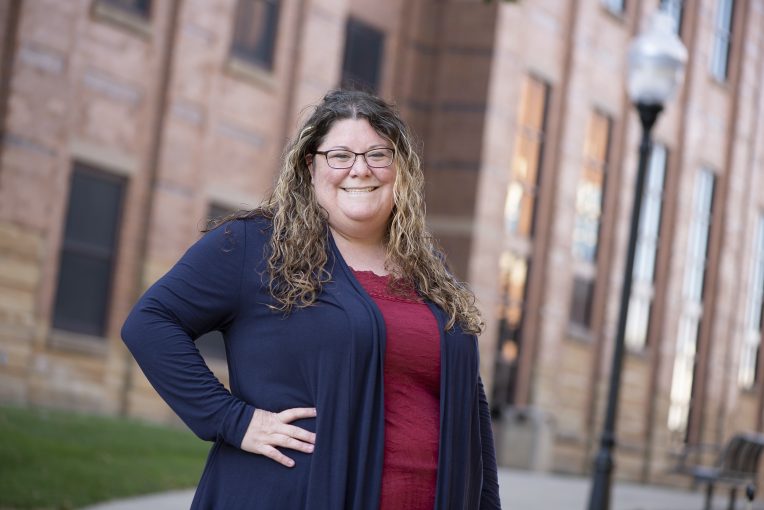One of the challenges of online teaching is finding an effective method for assessing student learning beyond multiple choice tests. Dr. Tera Galloway, associate professor of management and quantitative methods in the College of Business, has given the topic a lot of thought.
During the summer she put together a 40-minute Power Point presentation in which she shared her ideas with fellow faculty members during two Zoom sessions sponsored by the Center for Teaching, Learning, and Technology (CTLT).
“Back in March when the pandemic started, CTLT asked me to be a mentor because I have some expertise in developing online classes,” Galloway said. “Over the summer when asked to do a workshop for the DIY Online Teaching Program, I chose to focus on assessment. I believe you need more than one modality if you want to assess performance.”
Based on her belief in multiple-modality assessment, Galloway measures students’ performance in such areas as leading class discussions, quality of reports and essays, group projects, case analyses, audience participation, online forums and exams.
Galloway said she tells her students that no one thing will make them fail her class because she believes no single thing should be an indicator of performance. For example, as a student she found that she didn’t always test well, but her ability to write essays helped get her into academic programs.
“A single point of assessment, be it an exam, paper or project, is exactly that…a single shot, and maybe you slept poorly or had a bad day,” she said. “I don’t think it’s fair that one moment in time should mark your success or failure, and online puts things on a different level of complexity.”
She’s also big on what she calls honor or integrity pledges.
“With my students I have them take the integrity pledge at the beginning of the semester,” she said. “And before every exam there is a true/false question where they are asked to promise they will not talk to anyone else during an exam or use external resources during the taking of an exam.”
She understands that switching to online teaching has been a challenge for some faculty members and that it has required a lot of change. But, she doesn’t think it has to be the deficit that some worry it could be.
“The online modality even does a better job in some ways of assessing students,” Galloway said. “Especially if we can find ways to engage students in collaboration and discussion.”
She noted a day during the pandemic when her internet signal was weak just as she was supposed to lead a discussion of a case that involved Netflix, and her students couldn’t hear her.
“So, I did everything via chat mode, and it was beautiful,” she said. “They could see the Power Point, and they engaged each other in the chat. Students who never talked before were participating, and one typically quiet student made three or four amazing comments.”
The lesson for the teacher, Galloway said, was that with proper use of the chat feature she could draw out students who didn’t normally participate in face-to-face situations. She discovered other benefits as well.
“You can also encourage them in private in the chat mode by telling them that their comments were great without embarrassing them,” she said. “Encouraging them to use those chat boxes in Zoom is another way of measuring participation.”
Galloway’s efforts aligned with part of CTLT’s mission to support faculty as they pursue “excellence and innovation in teaching, student learning, and the effective use of technology.”
In addition, Galloway had follow-up Zooms with some faculty members to talk about specific ideas that would fit their classes. Hulda Black, an associate professor of marketing, attended one of Galloway’s sessions and also had a private follow-up Zoom session. She came away feeling better prepared to assess students in an online environment.
“She’s very effective and brings a wealth of knowledge,” Black said of Galloway. “She’s a clear communicator, very organized, and 100 percent accessible.”
Although Black’s is a mostly project-based class, she also gives some quizzes and had the worry that in an online situation students might use their phones to help find answers. Galloway’s suggestion was simple: keep the quizzes short and to the point so there’s no time for anything else.
Galloway has a lot of faith in the quality of students at Illinois State noting that they respond when pushed academically.
“I love teaching here. There’s a good Midwestern work ethic here that I appreciate,” she said. “Students here rise to the occasion when you demand something from them in a class.”
She also enjoyed the experience of helping her teaching colleagues make the transition to online instruction.
“It made me feel more connected to the University,” Galloway said.
Apply now for fall 2021.

